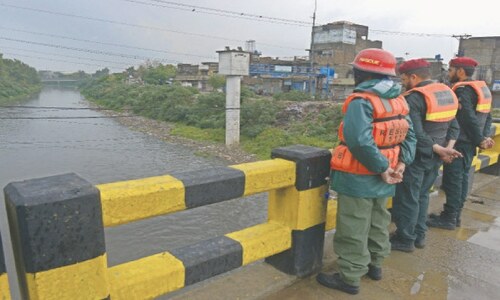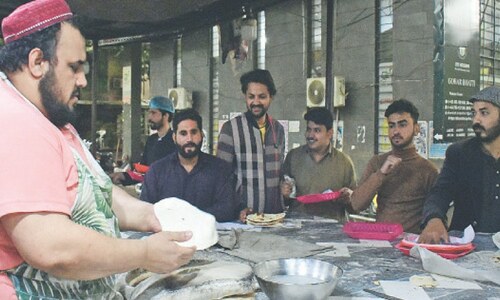ISLAMABAD: At the launch of his book of fictional short stories, titled Invisible People, Senate Chairman Mian Raza Rabbani said he was not a writer, but the “invisible people” had caught him by the finger and suggested he write for the underprivileged people of Pakistan, who would not be considered newsworthy by the media.
The book launch was held at a local hotel on Wednesday.
“One story is about a labourer, who was unwell and stretched out on a bench outside a hospital because there was no bed for him inside the hospital. The labourer’s four year old daughter was running from pillar to post to convince doctors to admit her father, but she was ignored,” Mr Rabbani said.
“The labourer is thinking about the mill owner, who remembered him when he was useful and discarded him when he was not. He thinks about his wife, whom he married after he fell in love with her, but could not provide her with basic facilities.”
Another one of his stories, he said, was about a girl who was kidnapped. While people spoke against the incident and expressed sympathy with the family, when the girl comes back many years later and gets married, no one is willing to accept her.
“That girl became persona non grata for society, especially the country’s elite,” he said.
Another story is about a mother whose son was arrested for stealing a bicycle. “The woman runs from pillar to post and asks every person if he is a judge, but fails to get her son released by the police.
One say, she sees a person who comes to court in a Pajero and after a while, leaves the court showing victory signs.”
“The woman asks an official of the court what happened, and she is informed that the person has gotten justice and been acquitted in a case. The woman fails to get justice for her son because she is poor,” he said.
Mr Rabbani said he decided to write because he was frustrated by what he had seen throughout his life, and wrote what he saw and felt in the form of stories.
Another speaker at the launch, Senator Taj Haider, said that while he was listening to the speakers, people were gossiping about whether those invisible people were from intelligence agencies.
“If the unelected part of the state always works for the elite class, it is the duty of the elected people to work for the rights of the poor. If wealth continues to move from the exploited to the exploiter and then out of the country, the common people will remain poor,” Mr Haider said.
Former senator Afrasiab Khattak also spoke at the event, and called Mr Rabbani’s stories interesting and meaningful.
“Remarks were made in various local languages, which gave the impression that the writer had perfect knowledge of the characters, their society, environment and problems,” he said.
Writer and journalist Ghazi Salahuddin said fiction writing gives people the power of empathy, but unfortunately the ruling elite do not read books.
“Creative writers have more understanding of the issues as compared to politicians. Invisible people can be seen in the civil courts, hospitals, etc. If anyone wants to know about the reality of the society, he should read this book,” he said.
Mujahid Barelvi, a journalist, spoke about his life as a student and said Mr Rabbani’s command of the English language, they were able to win over leftists at Karachi University. “In March ’77, Mr Rabbani decided to contest parliamentary elections, and after that he was arrested, which changed his life,” he said.
The dean of the National University of Modern Languages’ English department, Dr Safeer Awan, said that the book causes the reader to think about whether Pakistan is a postcolonial or new colonial state.
He said the language used in the stories also shows that the author has great knowledge of the issues.
The book launch was attended by a large number of politicians, diplomats and journalists, including National Assembly Speaker Ayaz Sadiq, Ishaq Dar, Zahid Hamid, Mir Hasil Khan Bizenjo, Safdar Abbasi and Naheed Khan.
Published in Dawn, February 9th, 2017















































Dear visitor, the comments section is undergoing an overhaul and will return soon.